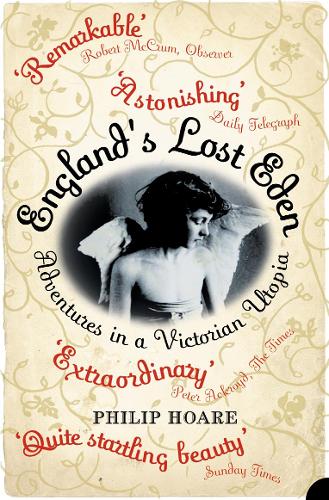
Englands Lost Eden: Adventures in a Victorian Utopia
(Paperback)
Publishing Details
Englands Lost Eden: Adventures in a Victorian Utopia
By (Author) Philip Hoare
HarperCollins Publishers
HarperPerennial
2nd March 2006
United Kingdom
Classifications
General
Non Fiction
Christian and quasi-Christian cults and sects
Spiritualism
Biography: religious and spiritual
Mysticism
Unexplained phenomena / the paranormal
Religious and spiritual figures
History of religion
133.9094227509034
Physical Properties
Paperback
560
Width 129mm, Height 198mm, Spine 32mm
395g
Description
A kaleidoscopic story of myth, Spiritualism, and the Victorian search for Utopia from one of the brightest and most original non-fiction writers at work today. In 1872 there was a bizarre eruption of religious mania in Hampshire's New Forest. Its leader was Mary Ann Girling, a Suffolk farmer's daughter who claimed to be the female Christ and whose sect, the Children of God, lived in imminent anticipation of the millennium. It was rumoured that Mrs Girling mesmerised her supporters, literally hypnotising them to keep them in her power. Other reports claimed that the sect murdered their illegitimate offspring in their Utopian home at 'New Forest Lodge'. Through Mary Ann's story and the spiritual vortex around her, Philip Hoare takes us deeper into the pagan heart of the New Forest. In the neighbouring village of Sway, an eccentric barrister, Andrew Peterson, conducted seances in which the spirit of Christopher Wren instructed Peterson to build a 300-foot concrete tower to alleviate local unemployment. Wren, although dead for two centuries, even issued Peterson with the exact plans for the foundations and the formula for the concrete. It rose like some spiritualist lighthouse towering over the trees, and looming over the Shaker encampment and Mrs Girling's Children of God. At the same time, on the other side of the forest, in the grand country house of the Cowper-Temples, further experiments into the realms of the Victorian uncanny were under way. William Cowper-Temple, a supporter of Mary Ann Girling, vegetarian, anti-blood sport activist and member of Parliament, had joined his wife Georgiana in her Spiritualist quest. A third pair of hands came to the table, those of John Ruskin - the great Victorian artist, scientist, poet and philosopher - who sought the dead spirit of his beloved Rose La Touche. His explorations into the afterlife would eventually send him insane. Through this unique biography of the New Forest Philip Hoare paints a strange, and little known, portrait of Victorian England - a fascinating story of disorder in an avowed age of reason.
Reviews
'This is a terrific idiosyncratic piece of popular history' Sunday Times 'Philip Hoare has written of Mary Ann Girling with awe and respect' Craig Brown, Mail on Sunday 'A rich and rewarding account of Victorian religious cults'Independent on Sunday 'The book reveals an unglimpsed Victorian England - one pre-figured, perhaps, in late Dickens - a queasily halluncinatory, twilight place' Simon Callow, Guardian 'A compelling history' Scotland on Sunday Praise for Spike Island: 'Spike Island is a book that has everything a passionate reader could possibly want - a subject that far transcends the trivial pursuits of contemporary writing, concerns both public and private, astonishing details, stylistic precision, a unique sense of time and place, and a great depth of vision.' W.G.SEBALD Sunday Telegraph Books of the Year 'A psychological study of horror and spiritual displacement: human vulnerability pitted against the institutional administration of violence ! Philip Hoare's deeply personal foray into the past is a tour-de-force.' Michael Bracewell, Independent on Sunday 'Spike Island - elaborate, riveting, touching, strangely romantic - is itself a gothic tale ! few could combine such rigorous scholarly accuracy with Hoare's narrative flair.' Observer 'Gruesome, startling, grainily authentic, as if Hoare were inching his way through history's dark wood with a hand-held camera, reporting what he sees in close-miked voiceover. Spike Island comes as near as it is possible to get to a scholarly equivalent of The Blair Witch Project.' Hilary Spurling, Daily Telegraph
Author Bio
Philip Hoare is the author of six works of non-fiction: Serious Pleasures: The Life of Stephen Tennant (1990) and Noel Coward: A Biography (1995), Wildes Last Stand: Decadence, Conspiracy, and the First World War (1997), Spike Island: The Memory of a Military Hospital (2000), and Englands Lost Eden: Adventures in a Victorian Utopia (2005). Leviathan or, The Whale (2008), won the 2009 BBC Samuel Johnson Prize for non-fiction. Most recently, The Sea Inside (2013) was published to great critical acclaim. An experienced broadcaster, Hoare wrote and presented the BBC Arena film The Hunt for Moby-Dick, and directed three films for BBCs Whale Night. He is Visiting Fellow at Southampton University, and Leverhulme Artist-in-residence at The Marine Institute, Plymouth University, which awarded him an honourary doctorate in 2011.
